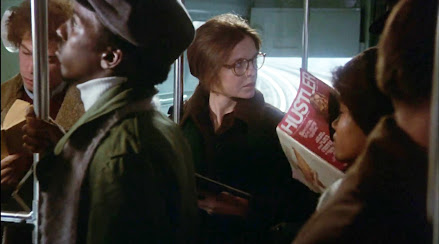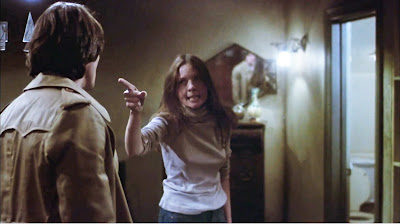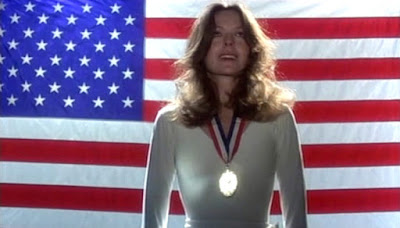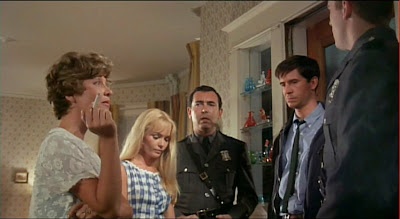In
hindsight, it seems coincidental and full of foreboding that both Looking for Mr. Goodbar and Saturday Night Fever were released within months of each other at the tail end of 1977 (October and December, respectively). These films brought a somber, reflective conclusion
to a year that began with the release of George Lucas' escapist blockbuster Star
Wars.
.JPG) |
| Diane Keaton as Theresa Dunn |
Both of these films embodied attitudes that stood as barbed provocation to the 1970s in general, and the Utopian promise of sexual liberation in particular. The hopeful assurance that drugs, free love, sexual exploration, feminism, group therapy, hedonism, the new morality, and porno-chic were the self-fulfillment remedy for the oppressive restrictiveness of the past. Meanwhile, on a somewhat minor, but no less catastrophic cultural scale, cinematically speaking, the blockbuster success of Star Wars signaled the waning days of major movie studios showing any interest in making mature, challenging films like Looking for Mr. Goodbar.
When, in 1976, I saw Martin Scorsese’s trenchant urban nightmare Taxi Driver, I thought then that I had seen the most depressing film the '70s had to offer. Clearly, I hadn’t reasoned on what 65-year-old writer/director Richard Brooks (Cat on a Hot Tin Roof, In Cold Blood) had up his sleeve in bringing Judith Rossner’s controversial 1975 bestseller Looking for Mr. Goodbar to the screen. It was, without a doubt, the feel-bad movie of 1977.
Inspired
by the gruesome 1973 real-life murder of New York schoolteacher/singles bar
habitué Roseann Quinn, Brooks’ Looking
for Mr. Goodbar is part opaque
character study, part sociosexual thriller. It chronicles (with provocative moral ambiguity), the confused emancipation/dissociation of Theresa Dunn
(Diane Keaton): gifted teacher of deaf children by day, by night, pill-popping,
singles bar-hopper salving her scars—literal and psychological—through submersion in the twilight world of detached, casual-sex
encounters with anonymous, increasingly unsavory partners.
Theresa’s through-the-looking-glass (darkly) journey
is largely a reactive one. Her romantic skepticism, a result of an over-idealized fling with an emotionally abusive college
professor (Alan Feinstein); her lack
of desire for children, a dual response to her sister’s multiple abortions, and her
own fear of passing on congenital scoliosis. Her determined need for independence is most assuredly a backlash against the stifling life
options proffered by her bellicose father (Richard Kiley) who would have Theresa settle
down with a nice Catholic boy, cranking out one baby after another like her kid
sister Brigid (Laurie Prange).
That Theresa’s emancipation ultimately takes the
form of a paradoxical dual existence—"Saint Theresa by day and swinging Terry
by night”—signals not only her unresolved inner conflicts, but underscore a point I think is germane to the appreciation of Looking for Mr. Goodbar as something more complex and infinitely smarter than a simplistic moral cautionary tale about the dangers awaiting single women in the big, bad city.
It sheds light on the fact that the “New Morality” of the '70s did absolutely nothing to minimize or reconfigure the sexual double-standard. In spite of the newfound freedoms of the era, women were still viewed in terms of Madonna/whore. Their bodies and reproductive rights, open-forum landscapes for religious, politico-social debate; their very independence rendering them more vulnerable than ever as targets of male sexual aggression.
By way of example: most movie critics at the time blamed Theresa's violent fate on her reckless behavior. As though death was a foregone conclusion or some kind of patriarchal retribution for the sexually promiscuous female. Many weighed in on how self-destructive the character was, or how she harbored a death wish, but I don't recall a single critic placing the blame where it belonged: on her violent, mentally unstable rapist/murderer. That and a homophobic culture that encourages men to loathe anything feminine within themselves, and to gauge their masculinity on a scale of sexual performance and aggressive behavior.
It sheds light on the fact that the “New Morality” of the '70s did absolutely nothing to minimize or reconfigure the sexual double-standard. In spite of the newfound freedoms of the era, women were still viewed in terms of Madonna/whore. Their bodies and reproductive rights, open-forum landscapes for religious, politico-social debate; their very independence rendering them more vulnerable than ever as targets of male sexual aggression.
By way of example: most movie critics at the time blamed Theresa's violent fate on her reckless behavior. As though death was a foregone conclusion or some kind of patriarchal retribution for the sexually promiscuous female. Many weighed in on how self-destructive the character was, or how she harbored a death wish, but I don't recall a single critic placing the blame where it belonged: on her violent, mentally unstable rapist/murderer. That and a homophobic culture that encourages men to loathe anything feminine within themselves, and to gauge their masculinity on a scale of sexual performance and aggressive behavior.
 |
| Teaser ad from The Hollywood Reporter - 1977 |
 |
| Richard Gere as Tony Lo Porto |
Something told me that the enraptured lyrics (and moans) of all those disco songs weren't telling the whole story.
 |
| The '70s: The era of sexual revolution or dehumanization? Sex was more visible, but attitudes were still mired in sin, shame, and debasement |
Although I hadn’t yet read the book, I knew enough
about Looking for Mr. Goodbar and the incident that inspired it to be excited by the prospect of a contemporary film attempting to capture a cultural climate teeming with contrasts and contradictions.
.JPG) |
| Tuesday Weld snagged a Best Supporting Actress Oscar nomination for her role as Katherine Dunn, a walking microcosm of '70s self-absorption and the unfocused quest for the ideal existence |
WHAT I LOVE ABOUT THIS FILM
One of my favorite things about the '70s is that it was such a self-reflective era in motion pictures. In fact, a frequent
criticism leveled at American films at the time was that they, representative of
the “Me Decade” in general, were in a rut of compulsive navel-gazing. Nearly
always of the bleak, post-Watergate disillusionment sort. Looking for Mr. Goodbar was NOT the exception.
When the relatively hang-loose
permissiveness of the late '60s evolved into the self-conscious hedonism of the mid-'70s,
it wasn’t difficult to detect a hint of desperation behind disco music’s over-emphatic
exuberance. The search for fulfillment through sensual expression ofttimes gave off the sense of a prowl or hunt...but for what? With all the rampant drug and alcohol use, had
sexual liberation, once thought to be the gateway to honest and open human interaction,
become just another means of escaping reality? To numb the pain of existence? To shelter our
darker demons? To create a greater distance between people?
.JPG) |
| Looking for Mr. Goodbar could have been subtitled: The Pleasure Paradox The Pleasure Paradox is the belief that happiness, when pursued (that elusive Mr. Goodbar), remains ever beyond one's grasp |
Behind Looking for Mr. Goodbar's topicality and incendiary commingling of sex, guilt, and religion which so distracted critics at the time, the film is both artful and honest in its attempt to address many of the above-stated issues. More so than any film I've yet to see. Looking for Mr. Goodbar explores the fissures that began to show in the “If it feels good, do it” façade of the new morality. Tackling simultaneously: feminism, religious hypocrisy, the sexual double-standard, and America’s intractable linking of sex and violence.
When I first
saw Looking for Mr. Goodbar, I knew right away
it was something special. From the first saxophone strains initiating that gloriously unsettling title sequence, I was hooked. (The title sequence is like a short film in and of itself. It's a flowing montage of gritty black and white still shots capturing the vaguely dangerous allure of singles bars.)
The entire cast, Diane Keaton especially, makes something poignant and frighteningly real out of a story begging for sensationalism. Director Richard Brooks keeps to a palette motif of lights and darks; contrasting and paralleling the lighter scenes at the Dunn household (pitched to operatic levels) with the darkness of the emotional violence lurking on the sidelines of Theresa's solitary, but not lonely, independent life.
The jarring use of sound and William Fraker's dark, dark, dark cinematography (I initially thought it was shot by Gordon Willis) contribute to making Looking for Mr. Goodbar one of the most powerful movies of the '70s. And make no mistake about it, this movie scared the bejesus out of me. The book was so popular, even if you hadn't read it you knew how it was going to end; but knowing is not the same as being prepared. The harrowing,
near-unwatchable concluding moments of Looking for Mr. Goodbar left me feeling shell-shocked. That opening weekend, I still believe the reason I remained in the theater to watch it a second time was simply because I
was just too stunned to move out of my seat.
The entire cast, Diane Keaton especially, makes something poignant and frighteningly real out of a story begging for sensationalism. Director Richard Brooks keeps to a palette motif of lights and darks; contrasting and paralleling the lighter scenes at the Dunn household (pitched to operatic levels) with the darkness of the emotional violence lurking on the sidelines of Theresa's solitary, but not lonely, independent life.
 |
| Richard Kiley as Theresa's no-patience-for-imperfections father |
Not everyone’s
cup of tea for any number of reasons, Looking for Mr. Goodbar (dubbed Mr. Goodbarf by many left queasy by the film's violence) is for me an example of American self-reflective
cinema at its best. Not the least because it’s an adult film that takes
the risk of allowing itself to be misunderstood. I like that it doesn’t spell
everything out and tell you how you should feel or react. It has a point of view and even an agenda, but it doesn't invite you to agree with it so much as it encourages you to just think about it. Some people dismiss the film as simplistic, others find it to be moralizing and misogynistic, and some just don't care for it because the topic is too depressing and sordid. No matter what people ultimately think, few find it to be forgettable.
PERFORMANCES
Because there were so many interesting actresses around in
the '70s, it’s easy for me to forget that the decade was largely a boys’ club
devoted to buddy movies and misunderstood anti-heroes. By way of illustration, when the
time came to adapt Rossner’s woman-centric bestseller to the screen, only male
directors were considered: Bernardo Bertolucci, Bob Fosse (I shudder at the
thought), Mike Nichols, Sydney Pollack, and Roman Polanski.
Closer to the reality of the '70s is that on those rare occasions when an actress was called upon to play something other than the girlfriend or male support system (to get Goodbar, Keaton turned down the largely thankless Julie Christie role in Heaven Can Wait), the characters were so well-written (Katharine Ross–The Stepford Wives) and performances so superb (Jane Fonda–Klute), their prominence in my memory contradicts their actual scarcity.
 |
| LeVar Burton as Cap Jackson Looking for Mr. Goodbar marked the feature film debut of Burton, who became an overnight household name when the landmark miniseries, Roots aired earlier in the year |
Closer to the reality of the '70s is that on those rare occasions when an actress was called upon to play something other than the girlfriend or male support system (to get Goodbar, Keaton turned down the largely thankless Julie Christie role in Heaven Can Wait), the characters were so well-written (Katharine Ross–The Stepford Wives) and performances so superb (Jane Fonda–Klute), their prominence in my memory contradicts their actual scarcity.
Looking for Mr.
Goodbar is unequivocally my all-time favorite Diane Keaton movie. I
actually think it’s the best work of her career. But, apropos of the
dark/light contrasts of the Theresa Dunn character herself, I don’t think I would
have fully appreciated her work here were it not for my having previously seen her in Annie Hall (released the same
year). Onscreen almost constantly, Keaton's performance here is astonishingly raw.
The range and depth of her characterization appear simultaneously natural and going-for-broke risk-taking. As screen heroines go (anti-heroine?) Keaton's Theresa Dunn is a true original; I've never seen a character like her in a film before or since. She's dimensional, complex, contradictory, funny, and operates under her own agency. For my money, Diane Keaton is simply staggering and was a very inspired choice for the part. It really makes you wish the actress had pursued more dramatic roles.
As for the character itself, I've always considered Theresa Dunn to be '70s cinema’s first anti-heroine: a female sexual outlaw and cultural nonconformist. And, like all rebels, she’s not always likable, smart, or rational–just a paradoxical, vulnerable human being struggling to make sense of the contradictions of her nature, deciding for herself what she wants to be, and accepting the risks (which, as it turns out, are considerable in our culture of normalized female-directed aggression) of choosing to live life on her own terms.
Like a great many of her male counterparts in '70s cinema (portrayed by the likes of Richard Benjamin, Jack Nicholson, and Dustin Hoffman), Keaton's character delves into sex and drugs in a quest for self-discovery. And for once a woman’s exploration of her sexuality is presented in a manner both perceptive and honest enough to allow for the enjoyment of no-strings sex for its purely sensual appeal and the addictive nature of its ability to dull existential pain.
The range and depth of her characterization appear simultaneously natural and going-for-broke risk-taking. As screen heroines go (anti-heroine?) Keaton's Theresa Dunn is a true original; I've never seen a character like her in a film before or since. She's dimensional, complex, contradictory, funny, and operates under her own agency. For my money, Diane Keaton is simply staggering and was a very inspired choice for the part. It really makes you wish the actress had pursued more dramatic roles.
 |
| Alan Feinstein as Professor Martin Engle |
Like a great many of her male counterparts in '70s cinema (portrayed by the likes of Richard Benjamin, Jack Nicholson, and Dustin Hoffman), Keaton's character delves into sex and drugs in a quest for self-discovery. And for once a woman’s exploration of her sexuality is presented in a manner both perceptive and honest enough to allow for the enjoyment of no-strings sex for its purely sensual appeal and the addictive nature of its ability to dull existential pain.
 |
| "Get this into one of your two heads, the one that can think...I am my own girl! I belong to me!" |
Controversial and prone to dividing critics and fans alike into "love it/loathe it" camps exclusively, I think the fact that Looking for Mr. Goodbar is such a downer of a film is the reason it never received the credit it
deserved for the rather groundbreaking sincerity and seriousness with which it approached female sexuality. Anyone coming to Goodbar hoping for gauzy, soft-core porn cloaked in faux-feminist empowerment rhetoric (a la the popular Emmanuelle franchise) was in for a shock. Similarly, those who sought to see an allegory of a bad girl punished for her sins were left wanting, as well.
If screenwriter Brooks is guilty of anything, it's in being too honest. Taking a tack different from the book, the Theresa of the film is not the self-loathing masochist with a death-wish Judith Rossner wrote about (and so many critics longed for in order to help explain away their discomfort with the story's theme). She is simply a flawed, perhaps emotionally damaged woman who pays dearly for making one too many bad choices. Incidentally, Rossner was said to have been displeased with the film, finding Keaton's character too "happy."
Because things end badly for the character of Theresa, Looking for Mr. Goodbar was seen by many as an anti-feminist cautionary tale for single women. But I challenge that point of view as one laid at the feet of the viewer, not the film itself. I mean, things ended very badly for Peter Fonda and Dennis Hopper in Easy Rider, but I don’t recall anyone calling that film a cautionary tale for hippie drug dealers.
Because things end badly for the character of Theresa, Looking for Mr. Goodbar was seen by many as an anti-feminist cautionary tale for single women. But I challenge that point of view as one laid at the feet of the viewer, not the film itself. I mean, things ended very badly for Peter Fonda and Dennis Hopper in Easy Rider, but I don’t recall anyone calling that film a cautionary tale for hippie drug dealers.
THE STUFF OF FANTASY
I only
got around to reading Looking for Mr. Goodbar two years ago, an experience which
left me appreciating even more what Richard Brooks' skill as a screenwriter
(his first career) brought to the film version. To me, his work is a vast improvement over the source material, which I found too quick to place a big, glaring bullseye on Theresa's back. Richard Brooks, when faced with the challenge of making the character more sympathetic (aka, real) and extracting suspense from a story whose ending most everyone already knows, builds tension through the stylized application of a motif that's almost Biblical in its emphasis on the argument of free will vs the predeterminism of fate.
Brooks cannily uses innocuous events in the "light" parts of Theresa's life (as a teacher) to foreshadow the progressively violent trend of her "dark" nocturnal pursuits.
 |
| In assisting a deaf child to feel the forming of a word, Theresa has the girl hold her throat. A choking image that will be reenacted (horrifically) later. |
THE STUFF OF DREAMS
"How do women still go out with guys when you consider that
there is no greater threat to women than men? We’re the number one threat to
women! Globally and historically, we’re the number one cause of injury and
mayhem to women. You know what our number one threat is? Heart disease.”
 |
| Theresa's flights of fantasy reflect her conflicted self-identity |
The whole thing was quite ironic: while calling out Richard Brooks for making a morally reactionary sexual thriller, movie critics couldn't stop themselves from reaching the conclusion that promiscuity, drugs, and drinking were a certain fast-track to death for a single woman. A point which failed to acknowledge that promiscuity, drugs, and drinking were cornerstones for a great many male coming-of-age films of the era, but nobody saw anything fatalistic in men engaging in such "boys will be boys" behavior.
 |
| Tom Berenger as Gary |
A lot has changed over the years, but not so much that a daringly mature film like Looking for Mr. Goodbar doesn't have something relevant to say to contemporary audiences. As stated earlier, it's a film that begs to be rediscovered and reevaluated in terms broader than the lazy label of "cautionary tale" has afforded it. It's an unpleasant film, to be sure, but an honest one. Perhaps even a bit too honest. But it's an inarguably important entry from a decade when the objective of major motion pictures wasn't always to placate and pacify, but to get us to think. Unfortunately, I'm still looking for Looking for Mr. Goodbar...at least until the day Paramount decides to finally release it on DVD.

.JPG)

.JPG)
.JPG)
.JPG)

.JPG)

.JPG)
.JPG)

































